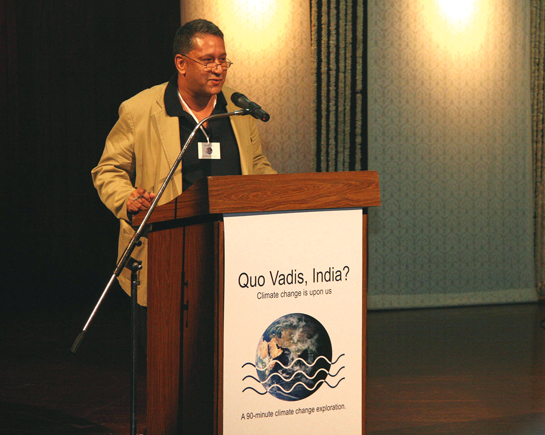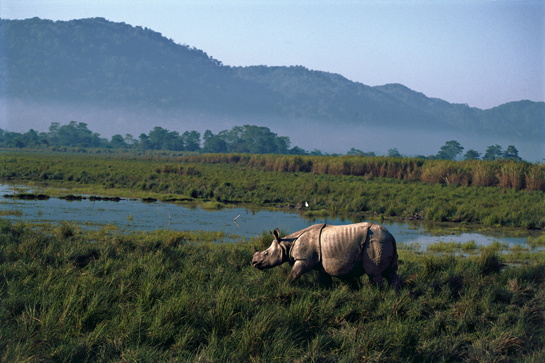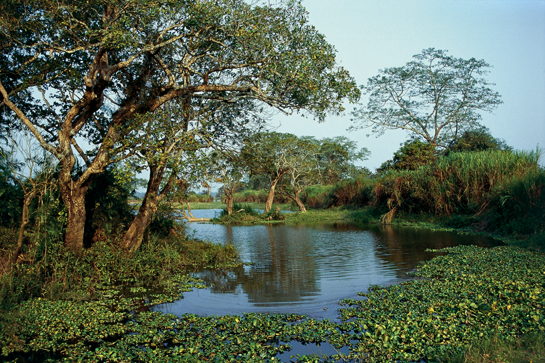Meet Ranjit Barthakur
First published in Sanctuary Asia,
Vol. 29
No. 11,
November 2009

Born in 1954 in Jorhat, Assam, to a family of lawyers, his childhood was imbued with Indian values and regular exposure to international issues. His father abandoned the legal profession in favour of planting tea. Ranjit Barthakurs life has been viscerally influenced by Kaziranga, the Brahmaputra, Assams floods and the fierce pride that Assamese everywhere are known for. He founded the Balipara Foundation and is the Chairman of Globally Managed Services (GMS). He speaks to Bittu Sahgal about Naturenomics™ and his personal dream to see his home state lead India towards more productive, more ecologically-sensible ambitions.
What drew a management consultant to wildlife?
Elephants! But I am not a management consultant. I see myself more as a knowledge advisor. I recall sitting as a child in Kaziranga along one of its many beels (lakes) looking at wild elephants in a wild lake. There was simultaneously something powerful, yet tragic about them. Humans had reduced their world to tiny cups of existence. As I watched, I saw a herd of Asiatic wild water buffaloes mock-threaten an elephant calf. Then three rhinos intervened as though protecting the calf. Soon the adult elephants joined the fray and drove the buffalo away long enough to drink their fill and bathe in the cooling waters. The rhinos were probably keeping the buffaloes at bay for their own reasons, but in my young mind, the rhino became the defender of an elephant and the elephant became the defender of the rhino and my admiration for this tapestry of nature never left me.
Post-Independence Assam must have been an exciting time in which to be born?
It most certainly was. The British were still passing on the political and administrative reins to Indians and the private sector was evolving its own management style and values. What bothered me, however, was the trend of elite Indians replacing the British as ‘people of privilege. I myself studied in an Irish missionary school that provided me with a holistic Indo-Anglian perspective. I was grateful to be part of history as ‘the empire dissolved with dignity and grace. Dr. Sarvapalli Radhakrishnan spoke for me when he said: “The transfer of power in India was one of the greatest acts of reconciliation in human history."
You and I co-authored The Kaziranga Inheritance and you have now launched the concept of Naturenomics™. You are actually trying to redefine economics. Do such ideas find resonance with decision makers?
Well, the Chief Minister of Assam has appointed me as a special advisor and I am working with key members of the Planning Commission to chart a plan for Assam that seeks to usher in development, while protecting the only perennial assets we possess - rivers, soils and forests. Yes there is resonance, but there is also realism. We cannot reverse industrialisation the way you might switch on or off a light bulb in your home. Its a slow, sometimes torturous process, but I believe we are moving inexorably in the right direction. I also support what you say that wildlife conservation is key to human survival because wild species are the gardeners of our Eden.
Are you nostalgic for the Assam you grew up in that has changed so radically?
The Assam I grew up in was a simple, honest, not materialistic, clean and happy place. People loved the earth and lived off it even as they respected it. Industrialisation had not yet arrived. Our festivals, mores, even the clothes we wore reflected the harmony and strength of Mother Earth. Instead of exporting this ability to merge with nature, we lost our way for a bit and tried to turn Assam into an industrial hub, ignoring the way other nature-rich states were suffering on account of pollution, deforestation and soil degradation. My life is now dedicated to resurrecting the simple wisdom of our elders, but not by ignoring modern imperatives and realities.
 Photo: Dr. T. Shivanandappa.
Photo: Dr. T. Shivanandappa.
With climate change a reality would you agree that all old bets are off and that economists will have to go back to school to learn how to live in a changed world? Is economics as we know it dead?
A chain of civilisations have come and gone and most died out because they refused to read the signals nature was sending them. Virtually all ended up abusing their environment. I believe history could be repeating itself. At the heart of my belief is the sure knowledge that land, labour and capital still remain the pillars of economics and development - perhaps with a fourth corollary thrown in - energy. While land has remained where it is, capital and labour have expanded exponentially, thus leading to an imbalance, which is at the root of most of todays environmental controversies and the economic roller coaster that confront all nations. Traditional economics is definitely on the descent. And a new economics - I call it Naturenomics™ - is hopefully on the rise. Thanks to our new understanding of climate change, I believe it is destined to become the dominant economic paradigm within five years.
So is India going to lead the charge? Will Assam be our testing ground?
No one can say. But if we keep plugging the Northern model of industrial development, India is going to find itself in troubled waters because the North itself is fast jettisoning this. Of course they are happy to take advantage of gullible countries in the South who hanker for all the ‘good things they see the North enjoying. We Assamese have a right to a higher standard of life, but we believe that this benefit can only accrue if we are able to restore the thermostat that controls the way the climate interacts with our land (forests and farms) and water (rivers, lakes and ground water). Yes, I believe Assam will be the source of Indias new economic resurgence and that Naturenomics™ will be the vehicle on which one billion people will evolve and develop sustainably.
So what are the first steps Assam will be taking?
First, we are beginning to overcome the sense of loss that Assam “missed the industrial bus." That was a stroke of good fortune. Despite our large numbers and the deforestation we have inflicted upon ourselves, we are still very, very rich in terms of ‘natural assets. The steps?
We hope to declare Assam a ‘Nature State where we seek to be carbon-negative, energy-positive, water-positive, and free from land, air and water pollution. These will be the filters through which future development options will have to pass as we help create an Eastern Himalayan Nature Zone where the seven sisters of the Northeast (Arunachal Pradesh, Assam, Meghalaya, Manipur, Mizoram, Nagaland and Tripura) work seamlessly for ecological security. This will benefit every last farmer, fisherman and forest dweller in Assam. Planned toxic industrialisation will be put on hold and past mistakes will be rectified as an article of faith of a new nature and economic policy. We fully expect countries that perpetrated climate change on the Earth, such as the United States, to finance this transition, which will ultimately benefit even a distant farmer in California because our planet is smaller than most believe.
And all this came to you while you were selling cigarettes? How do you feel about that track record of yours in light of the health issues associated with smoking today?
Over consumption of anything will damage our health. But yes, I helped sell a lot of cigarettes when I was with ITC in what seems a lifetime ago. It was a different time Bittu, with different values. My grandfather smoked way past his 80th year and I never fully appreciated the damage smoking could do. But we are all wiser now and the same wisdom must be applied to our addiction to traditional industrialisation and economics. And to other health risks, including noise pollution, carbon pollution, toxic waste, environmental degradation and what have you. Basically, whether shikar, smoking, caste issues, or the rights of women - you cannot judge yesterday by the values of today.
Ranjit, what exactly is Naturenomics™? Its a catchy name, but is the concept catchy enough to displace centuries of addiction to the economics of greed? And can you actually defy economic ‘gravity by willing wealth to trickle upwards?
I will need to give you a somewhat involved answer, but even that will not really be enough so I would request Sanctuary readers to visit www.naturenomics.com to truly get to the heart of the matter. Here goes: The global economy has risen since 1950, from U.S. seven trillion dollars to around U.S. $69 trillion in 2007 (based on purchasing power parity). This is considered by economists as a major success. But what has been the ecosystem cost of this growth? Shrinking forests, collapsing fisheries, soil degeneration, falling ground water levels, rising sea levels, climate change, vanishing species, drying rivers and lakes and water scarcity. Old fashioned economic development forces us to destroy our natural resources in exchange for development. Naturenomics™ suggests that losing our natural assets guarantees that the quality of human life will fall. It seeks to create ecologically ‘compliant assets sustainably. Put another way, we want to adjust the balance of power by replacing economics from the heart of all activity and replacing it with ‘nature assets as the soul of all activity.
 Photo: Dr. Anish Andheria.
Photo: Dr. Anish Andheria.
I love the way that sounds, but could you elucidate?
A Naturenomics™-based economy will secure four key natural assets - food, water, energy and environment. This means obtaining our food and water needs through effective land and water resource management and not by ‘mining these resources. For instance, hydrogen and solar-based fuels would replace carbon-based fuels. New sunrise industries would emerge to dominate the market. Fish-farming, bio-pesticides and bio-fertilisers, organic agriculture, fuel cells, wind turbines and non-toxic products of all descriptions could be widely distributed (not intensively). Industries inconsistent with such trends will decline, thanks to new laws coupled with active consumer resistance. A Naturenomics™-based economy would make the consumer feel like the king and not the puppet of irresponsible marketers.
You can count on Sanctuary being a key supporter. Lets shift gears. You have worked to protect Kaziranga for decades and are now working to have National Highway 37 shifted north of the Brahmaputra. Is this part of the Naturenomics™ thrust? How would the investment benefit Assam?
In all humility, I consider my personal contribution to Kaziranga and wildlife as next to nothing. I have tried to mobilise awareness and support for the park. National Highway 37 has to move because Assam needs a wider highway and Kaziranga cannot allow this if rhinos and other wildlife are to survive and access Karbi Anglong. The new alignment does not pass through critical ecological spaces. The objective of quick traffic movement is assured. Yes, this is Naturenomics™ at work.
Did the Naturenomics™ vision come to you in an instant, or did it evolve gradually?
It was part of my own personal evolution. I have grappled to understand what the modern word ‘development signifies. Why should so-called development be denied to Arunachal Pradesh because we do not want large dams to destroy forests? If all economic evaluation is done on the basis of per capita income GDP, what incentive has been created for the people of Arunachal Pradesh to preserve their natural treasury when the Ministry of Finance, the Ministry of Power and the Ministry of Water Resources (which want large dams like the Lower Subansiri constructed) believe forests are virtually valueless to the national treasury? I personally believe that large dams will kill the Northeast, but I had to somehow find new valuations, new frameworks and a new articulation to define development. Thus Naturenomics™, which is at its infancy right now, but will grow to dominate the world.
First published in: Sanctuary Asia, Vol. XXVII No. 5, October 2007.



 Photo: Dr. T. Shivanandappa.
Photo: Dr. T. Shivanandappa. Photo: Dr. Anish Andheria.
Photo: Dr. Anish Andheria.